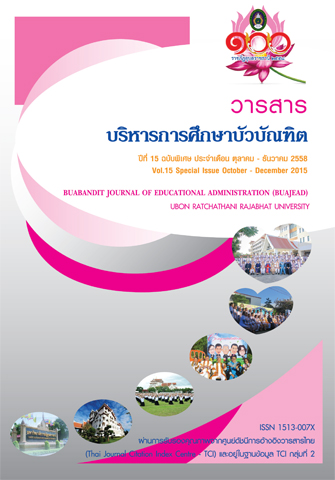แนวทางการพัฒนาครูให้มีจิตอาสาในสถานศึกษาขั้นพื้นฐาน
Main Article Content
บทคัดย่อ
การวิจัยครั้งนี้ มีวัตถุประสงค์เพื่อสร้างและพัฒนาแนวทางการพัฒนาครูให้มีจิตอาสาในสถานศึกษา ขั้นพื้นฐาน โดยใช้รูปแบบการวิจัยแบบผสมผสานวิธี กลุ่มเป้าหมายที่ใช้ในการวิจัย ประกอบด้วย ผู้เชี่ยวชาญ จำนวน 5 คน เพื่อใช้ศึกษาสภาพปัจจุบัน ปัญหาและแนวทางในการพัฒนาครูให้มีจิตอาสาในสถานศึกษาขั้นพื้นฐาน โดยการสัมภาษณ์ และศึกษาโรงเรียนต้นแบบด้านการพัฒนาครูให้มีจิตอาสา จำนวน 3 แห่งเพื่อสร้างและพัฒนา แนวทางการพัฒนาครูให้มีจิตอาสาในสถานศึกษาขั้นพื้นฐาน เครื่องมือที่ใช้ในการวิจัย ประกอบด้วย แบบสัมภาษณ์ เชิงลึก และแบบประเมินความเหมาะสม ความเป็นไปได้ และความเป็นประโยชน์ของแนวทางการพัฒนา การวิเคราะห์ข้อมูลโดยการวิเคราะห์เนื้อหา ในประเด็นการปรับปรุงแก้ไขแนวทาง และได้รวบรวมข้อสังเกตและ ข้อเสนอแนะมาพัฒนาร่างแนวทางอีกด้วย สถิติบรรยาย ได้แก่ ค่าเฉลี่ย และส่วนเบี่ยงเบนมาตรฐาน
ผลการวิจัย พบว่า
1. ผลการศึกษาสภาพปัจจุบัน ปัญหา และแนวทางในการพัฒนาครูให้มีจิตอาสาในสถานศึกษา ขั้นพื้นฐาน พบว่า ครูเป็นบุคคลที่มีความสำคัญเป็นอย่างมาก แต่ปัจจุบันปัญหาที่ส่งผลต่อคุณภาพการศึกษาคือ ครูไม่รู้บทบาทหน้าที่ของตนเอง หลักสูตรเปลี่ยนแต่ไม่รู้จะปรับเปลี่ยนอะไร มีหน้าที่อะไรเพิ่มขึ้น ครูสนใจแต่ตนเอง ไม่สนใจเด็ก เช่น การทำวิทยฐานะ การเป็นวิทยากร ครูส่วนใหญ่ขาดจิตวิญญาณความเป็นครู ขาดความตระหนัก ในหน้าที่ของตนเอง การพัฒนาครูที่ผ่านมาเน้นไปในด้านวิชาการ แต่ไม่ได้เน้นการพัฒนาด้านคุณธรรม จริยธรรม จิตสาธารณะ นอกจากนี้การพัฒนาครูโดยภาพรวมยังทำได้ไม่ทั่วถึง ไม่ครบทุกสาระ ไม่ครบทุกคน ไม่ต่อเนื่อง และไม่ตรงกับสภาพปัญหา ทำให้ไม่ส่งผลต่อการพัฒนาคุณภาพของเด็กเท่าที่ควร ส่วนแนวทางการพัฒนาครู ให้มีจิตอาสา มีขอบข่ายการพัฒนา ประกอบด้วย การสร้างแรงบันดาลใจ การบ่มเพาะความรัก ความเมตตา และจิตอาสา การสร้างชุมชนแห่งการเรียนรู้ และการสร้างเครือข่าย โดยใช้วิธีการประชุมเชิงปฏิบัติการ การเรียนรู้ จากการปฏิบัติงาน และการนิเทศงาน เพื่อให้ครูมีจิตอาสาในการพัฒนาวิชาชีพครู
2. ผลการสร้างแนวทางการพัฒนาครูให้มีจิตอาสาในสถานศึกษาขั้นพื้นฐาน ประกอบด้วย หลักการ จุดมุ่งหมาย คุณลักษณะของครูที่มีจิตอาสา ขอบข่ายการพัฒนา วิธีการพัฒนา การประเมินผล และ เงื่อนไขความสำเร็จ มีองค์ประกอบหลัก 7 ด้าน องค์ประกอบย่อย 96 ข้อ และคู่มือการใช้แนวทางการพัฒนาครู ให้มีจิตอาสาในสถานศึกษาขั้นพื้นฐาน มีสาระสำคัญประกอบด้วย 3 ตอน คือ ตอนที่ 1 บทนำ ตอนที่ 2 องค์ประกอบของแนวทางการพัฒนา ได้แก่ หลักการ จุดมุ่งหมาย คุณลักษณะของครูที่มีจิตอาสา ขอบข่าย การพัฒนา วิธีการพัฒนา การประเมินผล และเงื่อนไขความสำเร็จ และตอนที่ 3 เกณฑ์การประเมิน
3. ผลการประเมินแนวทางการพัฒนาครูให้มีจิตอาสาในสถานศึกษาขั้นพื้นฐาน พบว่า แนวทาง การพัฒนาครูให้มีจิตอาสาในสถานศึกษาขั้นพื้นฐาน และคู่มือการใช้ โดยภาพรวมและรายด้าน มีความเหมาะสม ความเป็นไปได้ และความเป็นประโยชน์อยู่ในระดับมากที่สุดทุกด้าน
4. ผลการนำเสนอแนวทางการพัฒนาครูให้มีจิตอาสาในสถานศึกษาขั้นพื้นฐาน สรุปว่า แนวทาง การพัฒนาครูให้มีจิตอาสาในสถานศึกษาขั้นพื้นฐานและคู่มือการใช้โดยภาพรวมและรายด้าน มีความเหมาะสม ความเป็นไปได้ และความเป็นประโยชน์ อยู่ในระดับมากที่สุดทุกด้าน
The Guidelines for the Development of the Teachers’ Public Mindedness in the Primary Schools
The research aimed to construct and develop the guidelines for the development of the teachers’ public mindedness in the primary schools by using a combine research method. The samples in the research consisted of five experts used to study the current conditions, problems and guidelines to develop the teachers’ public mindedness in the private schools and three model schools. The research instruments were the in-depth interview, and the format used to evaluate a suitability, possibility and usefulness. Descriptive statistics were mean and standard deviation.
The research findings were as follows.
1. It was found that teachers played a very important role; however, at present they hardly know their own roles and duties; they were interested only in themselves, not in students; the majority of the teachers had no spirit of teaching profession, they were unaware of their duties; the teacher development in the past was focused more on academic affairs, not on virtues, moral, and public mindedness. Besides, the teacher development was not inclusive, not consistent and not in line with the problems. As a results, students’ quality was negative affected. The recommendations were there should be a development network which consisted of inspiration, affection, compassion and public mindedness, a learning community, workshop, practice-based learning and supervision.
2. The guidelines to develop the teachers’ public mindedness in the private schools comprised the following: principles, objectives, characteristics of public mindedness, development network, development methods, evaluation and success conditions. There were 7 principal components and 96 minor components. A handbook on the guidelines for the development of the teachers’ public mindedness had three major sections: section one: introduction; section two: principles, objectives, characteristics of public mindedness, development network, methods, evaluation and success conditions; section three: evaluation criteria.
3. Based on the evaluation of the guidelines, it was found that the guidelines in the study were found to be suitable, practical and useful at the highest level in all aspects.
4. Based on the presentation of the guidelines, it was found that the guidelines in the study were found to be suitable, practical and useful at the highest level in all aspects.

